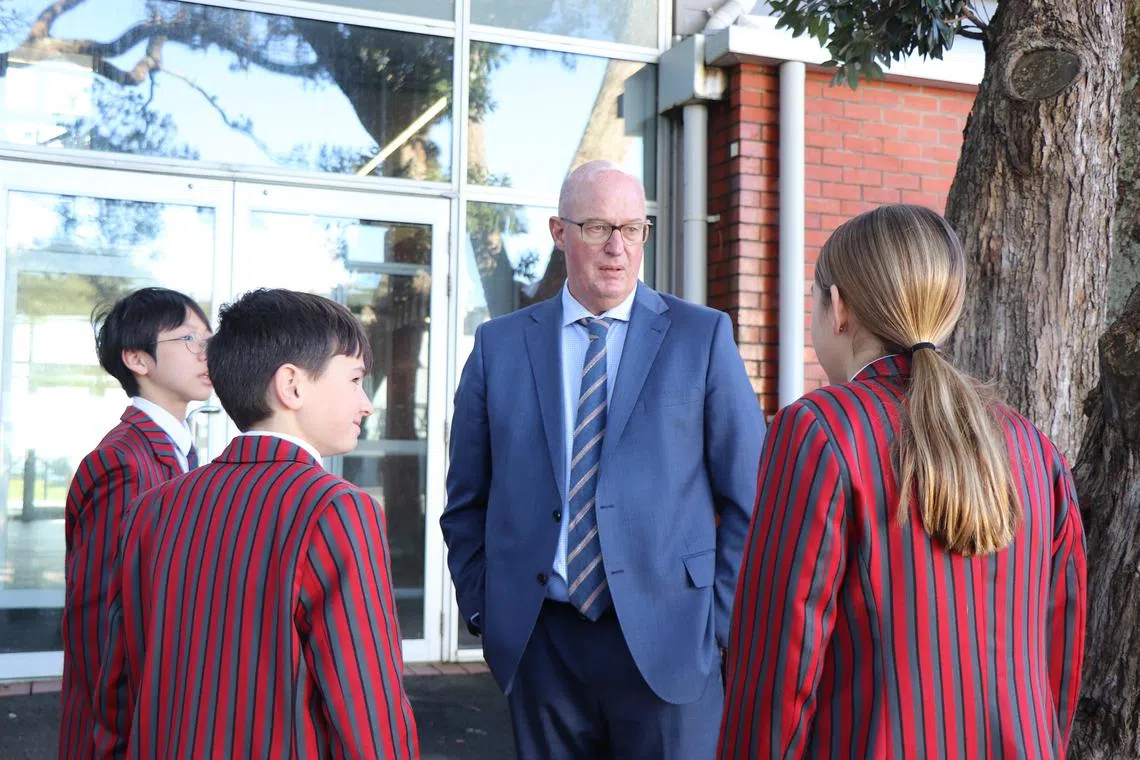‘Disastrous, useless’: New Zealand to overhaul high school qualification to lift falling standards
Sign up now: Get insights on Asia's fast-moving developments

Headmaster of privately-run Scots College Graeme Yule welcomed the reforms for adding more rigour and competition into the system.
PHOTO: SCOTS COLLEGE
WELLINGTON – Disastrous, terrible and useless. This is how Dr Jamie Beaton, co-founder of consultancy Crimson Education, described New Zealand’s high school national qualification, which has been put on the chopping block by the Education Minister recently.
Dr Beaton, who has 11 degrees from top universities around the world including Harvard and Oxford, did not hold back as he described to The Straits Times how grade inflation and dependence on internal assessments had made “school easy” and the qualification “fairly worthless” on the world stage.
The chief executive of Crimson Education, which helps high school students from New Zealand and other countries, including Singapore, secure places at the world’s top universities, has long viewed the National Certificate of Educational Achievement (NCEA) as putting local students at a disadvantage.
It has been the main qualification for high school students since 2002.
NCEA was designed to be flexible and standards-based, catering to both academic and vocational pathways, including trades, hospitality and tourism. Each standard represents a specific set of skills and knowledge, and students earn credits when they achieve those standards. When they accumulate enough credits, they will earn an NCEA certificate or endorsement. Both internal assessments and external exams contribute to students’ final grades.
“We do send plenty of NCEA students abroad, but it is fundamentally a major disadvantage,” said Dr Beaton, adding that it is little surprise that leading Kiwi schools offer their students the Cambridge A-Level exam or the International Baccalaureate (IB) programme.

CEO of Crimson Education Jamie Beaton, who has 11 degrees from top universities globally, described NCEA as a major disadvantage when applying for universities overseas.
PHOTO: CRIMSON EDUCATION
He urged a return to robust, standardised external examinations to bring the average New Zealand student “close to being globally competitive” and stop the slide in the country’s university standards over the years.
Addressing the mounting concerns about NCEA’s credibility, Prime Minister Christopher Luxon and Education Minister Erica Stanford announced on Aug 4 sweeping reforms to the national qualification.
Under the plan, NCEA will be replaced by a more traditional subject-based qualification for Years 11 to 13 (ages 15 to 18). Students would study five core subjects per year, with learning assessed mainly through national external examinations in Years 12 and 13.
This marks a big shift away from NCEA’s current credit-based model where students take a mix of internal assessments, projects and exams.
The reforms aim to address the longstanding criticism that NCEA is too fragmented and inconsistent, allowing students to “credit shop” by picking easier assessments to pass.
Ms Stanford said: “I didn’t know why you can get credits for having a part-time job or filling in forms, and I didn’t understand why kids say that they don’t need to go to exams or participate in chunks of their learning because they already have enough credits.”
The new system will also introduce an A-to-E grading scale from zero to 100, eliminating the current grading of “unachieved, achieved, merit and excellence”. The government hopes the new grading would be easier to understand for parents, employers and overseas universities.
The reforms, under consultation until mid-September, are set for a phased roll-out from 2028 to 2030. The new curriculum will be taught from 2026 and will affect students entering Year 9 that year.
Since coming to power in late 2023, the coalition government led by the National Party has made lifting educational standards its education priority amid concerns over declining achievement statistics.
It has introduced new mathematics and English curricula and made teaching structured literacy skills compulsory in primary schools. It has also stopped building open-layout classrooms as they were too noisy and distracting for children.
Despite these changes, concerns remain about student outcomes at the high school level.
New Zealand high schoolers recorded their worst-ever results in the last Programme for International Student Assessment released in December 2023, including a significant 15-point drop in maths score.
The international study, conducted every three years by the Organisation for Economic Cooperation and Development, placed Singapore at the top of the league among 81 countries in maths, science and reading. New Zealand ranked 10th in reading, 11th in science and 23rd in maths.
In addition, the latest school-leaver data in New Zealand also underscores the urgency for reform.
Despite a slight improvement in 2024, achievement levels have been declining since 2020, with only 55.5 per cent leaving school with an NCEA Level 3 qualification (equivalent to A-level) in 2024.
Mr Graeme Yule, headmaster of Scots College in Wellington, told ST that under the current system, many students skip exams and some schools stop their students from taking external exams to increase their pass rate.
Scots College is a private school that offers both NCEA and IB programmes.
Welcoming the reforms, Mr Yule said: “I like the fact they are adding more rigour. I like the fact that students are going to have to sit some comparable exams so we can compare students. I like the fact that there is some competitiveness in the system.”
Parent Ho Li Ling, a 44-year-old finance professional, agreed that credit counting under NCEA has been confusing. She has heard from her daughters of classmates choosing easier subjects to earn credits, and even of students who had attained enough credits by Year 12 that they spent their final year “hanging around” without needing to complete further assessments or exams.
“NCEA feels like a fake comfort zone, misleading students to think life is about choosing an easy path,” she said.
Universities New Zealand, the peak body for the country’s eight universities, and the Employers and Manufacturers Association (EMA) are among stakeholders that have voiced support for the changes in high school education.
EMA advocacy and stakeholder engagement lead Joanna Hall described the switch to internationally benchmarked qualifications as “promising”. She added that “we have consistent feedback from our members that school-leavers are not work-ready, citing low levels of communication, digital literacy and fundamental reading and maths skills”.
Universities NZ chief executive Chris Whelan said the changes appeared to address concerns about NCEA’s lack of focus in developing deep knowledge and critical thinking needed to prepare students for university.
But he hopes to see more details of the new programme. “We don’t yet know what those subjects will be, or how they will relate to letting students know they are ready for entry into university studies.”
Not everyone agrees that the changes are the best way forward.
Calling the overhaul “a return to the factory model and a big step backwards”, the principal of state-funded Wellington High School, Mr Dominic Killalea, warned that “it risks alienating so many learners who thrive in the current system”.
In his message to parents, which he shared with ST, Mr Killalea defended internal assessments, saying they allow students to demonstrate their depth of knowledge beyond a three-hour pen-and-paper exam. He noted that the strength of NCEA lies in its flexibility to combine standards and create courses that are more appealing to students than some traditional subjects, or that prepare them for pathways beyond school.
“Narrowing curriculum implies a hierarchy of knowledge and risks marginalising areas such as the arts,” he said.
Jordan Turner, 17, who is in Year 12 in 2025, disagreed with the views that NCEA is broken or confusing.
“I understand why people say NCEA is too easy compared with A levels or IB, as it sounds like the workload and expectations aren’t the same. However, I’m not complaining because it makes balancing school, extracurriculars and life in general more manageable,” he said.
Parent and homemaker Bai Ling, 50, who has two school-going daughters, is sceptical that the reforms will deliver their goals.
“Are the teachers prepared enough to step up to the task? Without a concrete curriculum to show, how can teachers deliver effectively?” she asked.
Mr Chris Abercrombie, president of the Post Primary Teachers’ Association – which represents more than 25,000 secondary teachers – said the proposed changes have been talked about in recent years but have not been implemented or resourced adequately.
“The lack of adequate support for (NCEA), and political flip-flopping… mean teachers are left trying to fill the gaps. We need stability and certainty,” he said in a media statement.
While the parents Mr Yule spoke to are supportive of the changes to reverse the decline in educational standards, he said they are concerned about the impact on their children, particularly in the interim period. This may push them to choose IB because of the uncertainty.
“There is no guarantee that this government will even be in power when those changes come. We could have a change of government, and we could have more uncertainty over the next few years,” Mr Yule added.



